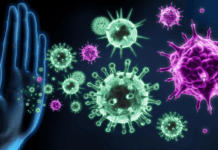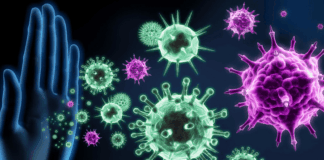
Research indicates that the consumption of wheat contributes to the growth of pathogenic bacteria in our gut, adding to growing concern that wheat (which is often contaminated with the Roundup herbicide) is one of the worst foods to consume for gut health.
A concerning study published in FEMS Microbiology Ecology, titled “Diversity of the cultivable human gut microbiome involved in gluten metabolism: isolation of microorganisms with potential interest for coeliac disease,” reveals something remarkable about the capabilities and liabilities of human gut bacteria (microbiome) when exposed to foods such as wheat.
This discovery is all the more interesting when you consider that, according to Alessio Fasano, the Medical Director for The University of Maryland’s Center for Celiac Research, the human genome does not possess the ability to produce enzymes capable of sufficiently breaking down gluten.
As reported on TenderFoodie, Dr. Fasano stated in interview:
“We do not have the enzymes to break it [gluten] down. It all depends upon how well our intestinal walls close after we ingest it and how our immune system reacts to it.”
The new study helps to fill the knowledge gap as to how humans are capable of dealing with wheat consumption at all, considering it did not play a role in the diets of non-Western peoples until very recently (perhaps only a few generations), and even in those who have consumed it for hundreds of generations, it is still on a biological scale of time a relatively new food in the human diet which was grain free for 99.999% of human evolution.
As we have analyzed in a previous essay, The Dark Side of Wheat, the consumption of wheat is a relatively recent dietary practice, stretching back only 10,000 years – a nanosecond in biological time. We simply have not had time to genetically adapt to its consumption (at least not without experiencing over 200 empirically confirmed adverse health effects!)
The new finding reported here shows that bacteria in our microbiome extend our ability to digest physiologically incompatible foods – or at least tolerate them to the degree that they don’t outright kill us. This may explain why there is such a wide variability in responses to gluten and why the health of our microbiome may play a — if not the — central role in determining our levels of susceptibility to its adverse effects.
Another provocative finding of the study is that some of the strains capable of breaking down the more immunotoxic peptides in wheat, including the 33 amino acid long peptide known as 33-mer, are highly pathogenic, such as Clostridium botulinum – the bacteria that is capable of producing botulism. As we discussed in a previous article on Monsanto’s Roundup herbicide (glyphosate) contributing to the overgrowth of this pathogenic strain of bacteria in animals exposed to GMO feed:
“[It]t only takes 75 billionths of a gram (75 ng) to kill a person weighing 75 kg (165 lbs). It has been estimated that only 1 kilogram (2.2 lbs) would be enough to kill the entire human population.”
There are several important implications to this finding. First, the consumption of wheat preferentially favors the growth of pathogenic bacteria in the gut. Second, given that much of the Western diet now contains Roundup herbicide contaminated food, including wheat – where Roundup is used as a pre-harvest dessicant, virtually guaranteeing it is contaminated with it despite being non-GMO – there is likely an amplifying effect of this pathogenic bacteria in those who consume both wheat and GMO food (i.e. synergistic toxicity). This may help to explain why the mass introduction of GMOs over the past decade has contributed to the explosion in diagnoses of gluten sensitivity.
Additionally, a recent article by Dr. Kelly Brogan, MD, discussed how the hunter-gatherer microbiome is conspicuously low in the Clostridium bacteria family, based on research into the modern hunter-gatherer Hadza gastrointestinal flora. This study indicates that for much of our evolution – the vast majority of it – Clostridium was not present in significant quantities in our bodies, likely because their diet did not encourage it.
From the perspective of our ancestral microbiome, modern humankind has become almost a new species due to our reliance on novel new ‘foods’ like wheat and agrochemical contaminated GMOs that have contributed to the development of a relationship with strains of bacteria that were alien to us, for some populations, even 100 years ago. The microbiome’s genome is 99% larger than our genome – containing 2 million protein coding genes versus only 23,000 for the human body alone. The shift towards pathological strains may have to do both with a radical change in the human diet to a grain-based — and particularly wheat-based diet – and, again, the ever-expanding consumption of Roundup herbicide laden foods.
So, what does this mean? Where do we go from here?
This study adds to a growing body of research showing that wheat is toxic to everyone, and not only to those with celiac disease. By forcing our body to become inhabitants of strains of bacteria that we have never before needed to occupy our bodies, and which are capable of doing great harm, it can lead to a wide range of health problems, such as infections and intestinal disases, that conventional medical thinking never connects to the diet. While some of the strains that degrade gluten are non-pathogenic (e.g. 39% were from the mostly beneficial Lactobacillus family), taken as a whole, the discovery that a variety of Clostridium strains (as well as related potentially pathogenic strains from genuses such as Klebsiella and Staphylococcus) thrive in a wheat-based diet, and adding in the fact that GMO foods further contribute to their overgrowth, it seems that the pathway towards optimal health requires the elimination of both.
Recommended articles by Sayer Ji:
- The Powerful Aspirin Alternative Your Doctor Never Told You About
- 13 Evidence-Based Medicinal Properties of Coconut Oil
- Group Drumming Better Than Prozac, Study Suggests
- 25 Cancer Stem-Cell Killing Foods That Are Smarter Than Chemo and Radiation
- How Pomegranate Puts Chemo and Radiation to Shame
- How Turmeric Can Save the Aging Brain From Dementia and Premature Death
- Dramatic Recovery in Parkinson’s Patient with Gluten Free Diet
- 6 Bodily Tissues That Can Be Regenerated Through Nutrition
- Fluoride Literally Turns the Pineal Gland to Stone, Research Suggests
- Why All Diabetics Should Know About Turmeric
About the author:
Sayer Ji is the founder of Greenmedinfo.com, a reviewer at the International Journal of Human Nutrition and Functional Medicine, Co-founder and CEO of Systome Biomed, Vice Chairman of the Board of the National Health Federation, and Steering Committee Member of the Global Non-GMO Foundation.
Disclaimer: We at Prepare for Change (PFC) bring you information that is not offered by the mainstream news, and therefore may seem controversial. The opinions, views, statements, and/or information we present are not necessarily promoted, endorsed, espoused, or agreed to by Prepare for Change, its leadership Council, members, those who work with PFC, or those who read its content. However, they are hopefully provocative. Please use discernment! Use logical thinking, your own intuition and your own connection with Source, Spirit and Natural Laws to help you determine what is true and what is not. By sharing information and seeding dialogue, it is our goal to raise consciousness and awareness of higher truths to free us from enslavement of the matrix in this material realm.
 EN
EN FR
FR



























The love of my life for the last 17 years was diagnosed with Parkinson’s disease nearly 4 years ago, at age 52. He had a stooped posture, tremors, muscle stiffness, sleeplessness, and slow movement. He was placed on Sinemet 50/200 at night for 7 months and then Sifrol and rotigotine were introduced which replaced the Sinemet but he had to stop due to side effects. He started having hallucinations, lost touch with reality. Suspecting it was the medications I took him off the Siferol (with the doctor’s knowledge) In March this year his primary physician suggested we started him on Natural Herbal Gardens Parkinson’s Herbal formula which eased his anxiety a bit, i’m happy to report this PD herbal treatment worked very effectively. His Parkinson’s is totally under control, he had a total decline in symptoms, the tremors, shaking, stiffness, slow movement and speech problems stopped. Visit Natural Herbal Gardens official web page naturalherbalgardens . c o m. My family are amazed at the change and rapid improvement. This herbal treatment is a breakthrough for all PD sufferers. SHARE WITH FRIENDS!!